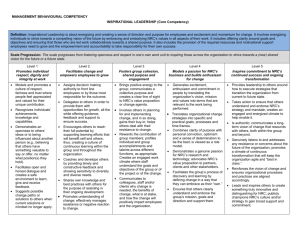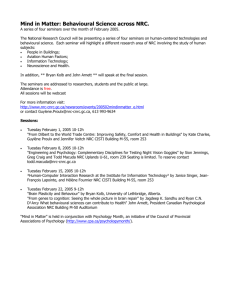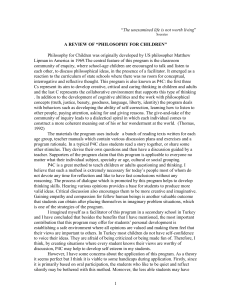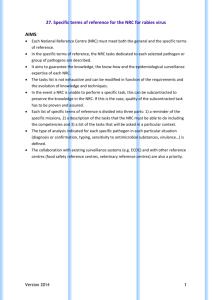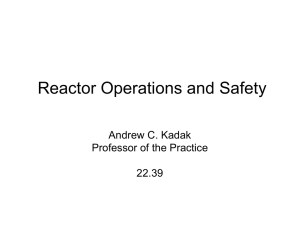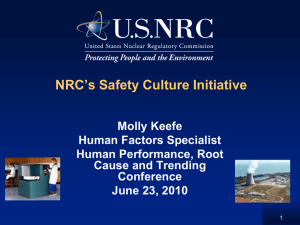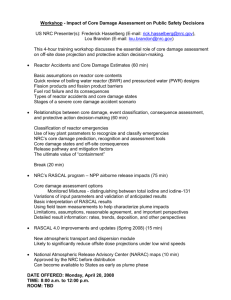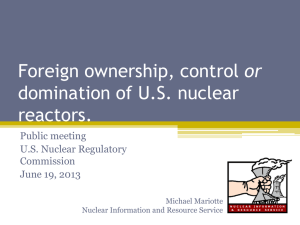Cumulative Impacts Presentation to the November 2013 NESCC Mtg
advertisement
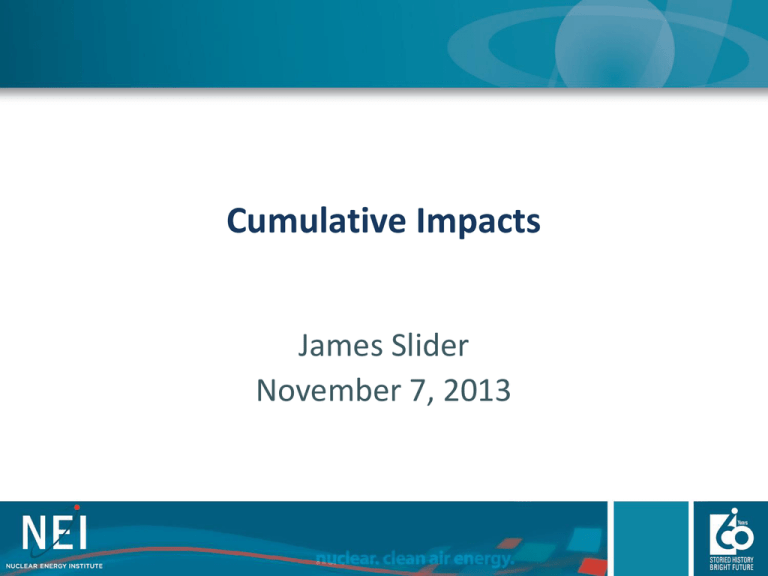
Cumulative Impacts James Slider November 7, 2013 Overview • The challenge • Prioritization • Regulatory analyses The Challenge • Since 2005, the U.S. nuclear industry has seen a substantial expansion in workload • The challenge is to ensure management attention and resources are focused on areas of highest significance to safety • More than ever before, NRC and industry need to work together to weigh, prioritize and implement regulatory and industry actions in an integrated manner consistent with safety significance Nuclear Utility Spending $5,000,000,000 Engineering and Equipment Reliability Regulatory CapEx Security O&M Licensing O&M Fuel O&M $4,500,000,000 $4,000,000,000 $3,500,000,000 $3,000,000,000 $2,500,000,000 $2,000,000,000 $1,500,000,000 $1,000,000,000 $500,000,000 $0 2005 2006 Source: Electric Utility Cost Group 2007 2008 2009 2010 2011 2012 Nuclear Utility Spending $2,000,000,000 $1,800,000,000 $1,600,000,000 $1,400,000,000 $1,200,000,000 Fuel O&M Licensing O&M Security O&M Regulatory CapEx Engineering and Equipment Reliability $1,000,000,000 $800,000,000 $600,000,000 $400,000,000 $200,000,000 $0 2005 2006 Source: Electric Utility Cost Group 2007 2008 2009 2010 2011 2012 Regulatory Cap Ex Spending 2,000,000 1,800,000 1,600,000 Fukushima Response Costs 1,400,000 Other (Regulatory) 1,200,000 Spent Fuel Storage Environmental 1,000,000 Security ALARA 800,000 Personnel Safety Emergency Preparedness 600,000 Nuclear Safety 400,000 200,000 0 2006 2007 2008 Source: Electric Utility Cost Group 2009 2010 2011 2012 Main Concerns • Company-initiated safety, security, and reliability improvements are squeezed out - Attention and resources diverted to regulatory needs of lower safety significance - Regulatory capital expenditures have increased and are unstable • NRC estimates of costs of implementation are off • Overlapping NRC actions cause rework Examples of Plant Improvements Deferred • Improvements to safety injection and feedwater control systems • Reactor vessel internal replacements • Dry-cask fuel storage improvements deferred because of unclear and evolving NRC requirements • Improvements in reactor coolant pumps Addressing Industry-Imposed Actions • INPO reviewing key processes: - Corrective action - Human performance - Work management • Understanding the focus of supervisor and manager workloads and oversight • Assessing effectiveness of industry initiatives, committees and organizations Addressing NRC-Imposed Actions • NEI offered 24 recommendations to accelerate, defer, amend or eliminate actions • Improve regulatory process - Issue definition and closure criteria - Regulatory analysis, basis and cost-benefit analyses - Prioritization and site-specific scheduling consistent with safety significance NRC Activities • Commissioners’ proposed initiative, Improving Nuclear Safety and Regulatory Efficiency, using PRA insights and results to set the regulatory agenda • NRC project for addressing cumulative impact of rulemaking • NRC-industry working group meetings 12 Initial Scope of Applicability • Rules and orders • Bulletins and Generic Letters - 10 CFR 50.54(f) letters • New generic safety issues and regulatory positions - Described in meeting summaries, correspondence including inspection reports, regulatory issue summaries and guidance documents Proposed Process & Template for Managing Cumulative Impact of Regulatory Actions Periodic Assessment New Issue Identified Against Original Definition Emerging Issue Assessment Assessment Issue Definition & Closure Criteria · · · Regulatory Analysis Adequate Protection Determination Cost benefit Determination Drop Reassess Generic Prioritization Initiate Regulatory Action Site Specific Prioritization & Integrated Schedule Drop Provisional Schedule • Tabletop exercises to test prioritization guidance 4Q 2013 • Amend guidance and proceed with pilot field implementation -- 1Q 2014 • Input into July 2014 NRC SECY on cumulative impact • Update guidance for NRC endorsement prior to industrywide implementation by end of 2014 Comparison of Estimated and Actual Implementation Costs 1449% NRC Estimate 1000% Actual Spend 347% 100% GSI - 191 402% 343% 100% NFPA - 805 * Initial estimate was for no additional costs. 100% 10 CFR 73 Security 100% Reg Guide 1.189 Rev 2* 100% Cyber Security* Case Studies on Variance between NRC estimates and Implementation Costs • Studies confirm extreme variance between NRC estimates and implementation costs • Determine the causes of the high variance • Need for better and earlier definition and implementation characterization • Industry will need to apply resources earlier to provide more detailed comments on NRC estimated costs Challenges & Issues • Industry communication and coordination • Changing cultures - What is perceived as important to specialist may be of low relative safety significance - More robust questioning of new regulatory positions and requirements • Disposition of low safety significant issues Summary • The number and complexity of new requirements demands a more integrated approach to managing plant improvements • The goal is to do the right things, in the right order, once • Industry and NRC must each do their parts to ensure the public interest in safe, reliable and economic nuclear energy is served

